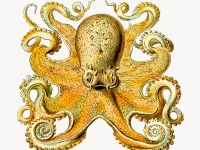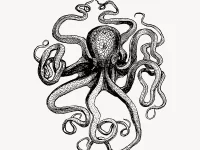In the shallow waters of the Atlantic Ocean, off the coast of Cape Town, South Africa, the star of the Netflix documentary “My Octopus Teacher” plays with a shoal of stream fish. By “star,” I of course mean the octopus. Flinging her arms out and scattering a group of fish, it’s clear she’s not hunting. There’s no sign of the focused, stealthy approach she’s perfected when catching crabs for dinner. She jets off towards another group of fish, looking much like a child chasing a flock of pigeons. “You see play often in social animals,” narrates Craig Foster, “Here’s a highly antisocial animal playing with fish.”
Octopuses are highly curious and intelligent animals. The coconut octopus has been observed carrying clam shells to act as an emergency shelter when traveling across the exposed seafloor. This demonstrates a high level of intelligence needed to anticipate the future. Other species of octopus are known to use their environment in a similar fashion, using the suckers that line their arms to build armor from loose rocks and shells. Tool use is surprisingly rare, only seen in 0.1% of animals. The kind of intelligence demonstrated by the coconut octopus — carrying tools for future use — is even rarer, having only been observed in chimpanzees, crows, and humans. Though it might be human arrogance at play to decide one species more deserving than another of ethical treatment, I strongly believe that there is no commercially viable way to farm octopuses in a manner that does not result in undue cruelty.
Researchers at the London School of Economics determined octopuses to be sentient creatures and outlined what they believed to be best practices from a review of over 300 scientific studies. The “Review of the Evidence of Sentience in Cephalopod Molluscs and Decapod Crustaceans” led to the octopus’ inclusion in the UK’s Animal Welfare (Sentience) Act 2022. With regard to octopus aquaculture, the report concluded that “high-welfare octopus farming is impossible.” Octopuses are highly solitary creatures, but for a farm to be commercially viable, the animals would need to be housed at close quarters. Animal psychologist Alex Schnell says, “In my 15 years of experience, I’ve never encountered a facility that groups octopuses together without incidents of aggression or escape.” Cannibalism is a common result when octopuses are housed together. Non-ideal living conditions can even lead to self-cannibalism or other self-destructive behaviors. At some point we have to ask ourselves, is this something we should be pursuing?
The company at the center of this debate is Nueva Pescanova, a Spain-based seafood company that, back in 2019, became the first to simulate the Octopus vulgaris (common octopus) life cycle in captivity (“Investigadores de Pescanova”). Two years later they announced plans for a commercial farm on Spain’s Gran Canaria Island. The farm would house 10-15 animals per cubic meter in sterile tanks and would slaughter roughly one million octopuses every year. Demand for octopus in affluent countries has grown dramatically with global production more than doubling since 1980. Over 370,000 tons of octopus meat is produced annually. Nueva Pescanova argues that farming octopuses could reduce pressure on wild populations, but the company is more likely motivated by the potential profits from mass-producing octopuses.
A study analyzing decades of historical data has found that an increase in aquaculture does not decrease wild fish captures. In fact, there is evidence that the increase in supply from commercial farms only fuels the demand for seafood products. Despite the aim of aquaculture farms to reduce fishing in natural aquatic ecosystems, it has been shown to only augment the existing supply without reducing wild captures.
Aside from possibly fueling the rise in demand for octopuses, there are additional environmental concerns with farming octopuses. Octopuses are carnivores, which makes feeding a commercial-scale farm no easy task. To produce one pound of octopus meat, 3 pounds of feeder fish meat is required. The primary source to feed these commercial-scale carnivorous fish farms is fishmeal and, particularly, fish oil. Produced by ‘reduction’ factories that process nutrient-rich fish, an estimated 69% of fishmeal and 75% of fish oil are used to feed farmed animals. One of the largest issues with this industry is the threat it poses to global food security, particularly in low-income areas. Processing plants that operate in West Africa create competition for local fish species, which threatens food security by reducing the availability and increasing the cost of fish. Ironically, despite touting the “narrative of food security,” aquaculture’s overreliance on fishmeal and fish oil in producing its two biggest exports, salmon and shrimp (prized for their commercial value), is contradictory.
Wild octopus fisheries are indeed threatened; however, there are more sustainable fishing methods that could be practiced. Consider the method used by local fishermen off the coast of Mexico’s Yucatán Peninsula. Using a long stick called a jimba, strings are attached that trail crabs along the seafloor. There’s one octopus that won’t be caught by this method and that’s a mother octopus. When a female lays her eggs, that signals the end of her lifetime. She will remain in the den protecting her eggs until she dies, giving up hunting for food completely. In this way, the jimba technique safeguards future generations of octopuses. In Yucatán, using a jimba is the only legal method of fishing for octopus, but not every fishery has these regulations. If we are to continue to rely on wild fisheries to feed the world’s demand for octopus, there are improvements we could be making.
So, what can be done to prevent the octopus aquaculture industry from gaining a foothold? A good place to start is making our voices heard through protests and petitions. Already, the outcry garnered by Nueva Pescanova’s plans has produced results. In July of 2024, The OCTOPUS Act — short for Opposing the Cultivation and Trade of Octopus Produced through Unethical Strategies — was proposed in the US Senate. The bill would preemptively ban octopus farms in the United States, and outlaw imported octopus produced from commercial aquaculture. However, more momentum is needed to convince Spain or the EU to take similar steps.
Commercial farming of octopuses presents not only an ethical problem but also a serious environmental concern. These intelligent creatures cannot thrive in the confined, unnatural conditions of a farm without severe suffering. Despite claims of sustainability, octopus aquaculture would do little to relieve pressure on wild populations and instead could exacerbate the depletion of global fisheries. As demand for octopus continues to rise, we must prioritize solutions such as more sustainable fishing practices rather than condemn a species ill-fit for captivity. By pushing for legislative action and spreading the word, we can protect these octopuses from being subjected to unnecessary cruelty and ensure their survival for future generations.



